 Petzlover
Petzlover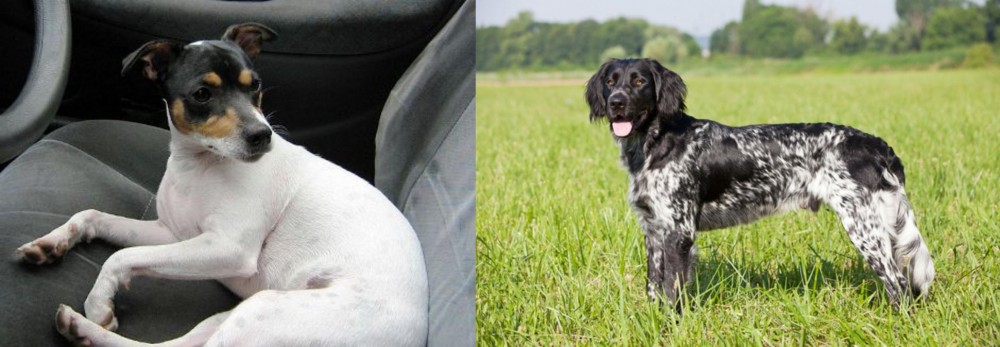 Chilean Fox Terrier is originated from Chile but Large Munsterlander is originated from Germany. Chilean Fox Terrier may grow 25 cm / 9 inches shorter than Large Munsterlander. Chilean Fox Terrier may weigh 23 kg / 50 pounds lesser than Large Munsterlander. Both Chilean Fox Terrier and Large Munsterlander has almost same life span. Chilean Fox Terrier may have less litter size than Large Munsterlander. Chilean Fox Terrier requires Low Maintenance. But Large Munsterlander requires Moderate Maintenance
Chilean Fox Terrier is originated from Chile but Large Munsterlander is originated from Germany. Chilean Fox Terrier may grow 25 cm / 9 inches shorter than Large Munsterlander. Chilean Fox Terrier may weigh 23 kg / 50 pounds lesser than Large Munsterlander. Both Chilean Fox Terrier and Large Munsterlander has almost same life span. Chilean Fox Terrier may have less litter size than Large Munsterlander. Chilean Fox Terrier requires Low Maintenance. But Large Munsterlander requires Moderate Maintenance
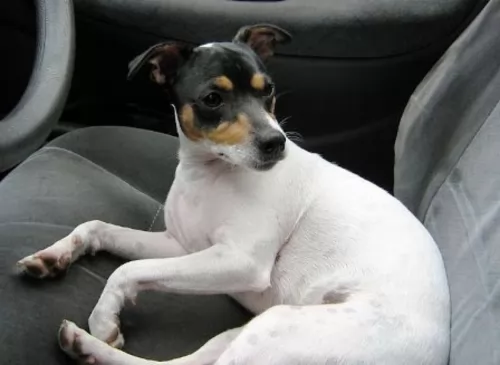 The Chilean Fox Terrier, developed in Chile, is a dog breed which comes from crossing the British Fox Terrier with some of the local Chilean dogs.
The Chilean Fox Terrier, developed in Chile, is a dog breed which comes from crossing the British Fox Terrier with some of the local Chilean dogs.
The dog is thought to have been developed in the 19th century already, some time between 1790 and 1850.
The dog is known for its skills in catching rats and mice. Known also as the Chilean Rat Terrier, Terrier Chileno or Ratonero, the Chilean Fox Terrier hasn’t achieved formal recognition with any of the leading canine organizations.
 The Large Münsterländer hails from the Münster region in Germany. It was in 1919 that the first breed club was founded.
The Large Münsterländer hails from the Münster region in Germany. It was in 1919 that the first breed club was founded.
The dog’s ancestors were different Spaniel breeds as well as the German Longhaired Pointer. The dog quickly became a sought after hunting dog in Europe.
The Large Munsterlander Association of America is the only official breed organization for this dog. The dog was recognized by the United Kennel Club in 2006.
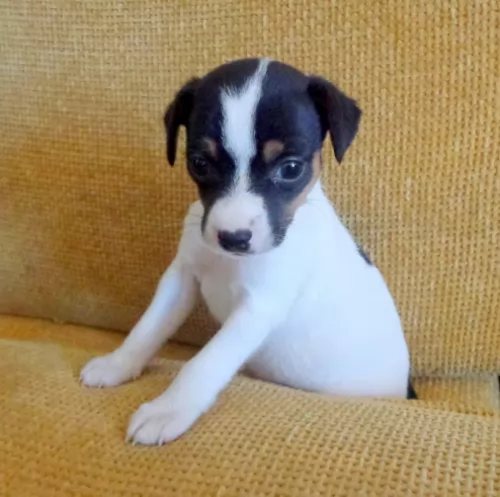 The Chilean Fox Terrier looks almost identical to his ancestors. He stands between 30 – 40cm and weighs between 5 to 9kg.
The Chilean Fox Terrier looks almost identical to his ancestors. He stands between 30 – 40cm and weighs between 5 to 9kg.
He is squarely proportioned, he is athletic looking and well muscled with long, slender legs. Many of these dogs are born with naturally short tails, but if not, then the tail is usually docked after the first or second vertebrae. Now that docking is falling out of favor, the breed is losing that distinctive look.
The head of the Chilean Fox Terrier is triangular with the muzzle being somewhat shorter than the Smooth Fox Terrier. The ears of the Chilean Fox Terrier are smallish and high set, being partially erect. The coat of the dog is short and thick and essentially white while the face is usually tan and black.
The Chilean Fox Terrier is loyal with his human family and can fit in well with a family where there are children and other pets.
Training and socialization become necessary for the dog so that he becomes obedient and amicable around his family and with strangers. He isn’t an aggressive dog but he is alert and can make an excellent watch dog.
He is dominant and confident and also intelligent and easily trainable. He is an active dog so he will require exercise every day, whether he lives in the city or in the country.
 The medium to large Large Munsterlander stands between 60 to 65cm at the withers and weighs about 28 to 32kg.
The medium to large Large Munsterlander stands between 60 to 65cm at the withers and weighs about 28 to 32kg.
When you look at him, you get the feeling that you’re looking at a springer spaniel. He has long broad feathery ears and also a long feathery tail. The head is fairly broad and somewhat rounded.
The coat of the dog is long and dense, and is quite wavy with feathering around the legs and tail. He can be black and white or be a reddish brown with patches or ticking because of the piebald gene. If you allow your Large Munsterlander to become a parent, the average litter of this dog is 5 to 10 puppies.
The Large Munsterlander is essentially a tracking, retrieving dog. He makes an excellent hunting dog and these instincts are strong within this particular breed. It is why some breeders only give their puppies to serious hunters.
He is an active dog, and because he loves to retrieve, ball games will suit him down to the ground. Take him with you on your walks as he is a naturally athletic, active dog.
He loves water too and won’t need a second invitation from you to jump right into dams or pools. He is such an easy going dog, getting on well with children and pets in the home and being a good first choice for first time dog owners too. However, he requires plenty of exercise.
Because he is a hunting and retrieving dog, he will be far better suited to living in a home where there is a fair sized garden. He isn’t regarded as a city dwelling dog. These are dogs that just love to be outside and running around.
The Large Munsterlander can be a boisterous dog, so teaching him some basic commands such as ‘come, stay, lie-down, sit or heel’ will improve the way he behaves inside the home and when in the company of other people.
Training and socialization will do him the world of good and it means you can take your dog anywhere – he’ll always be well behaved, becoming a calm, gentle dog.
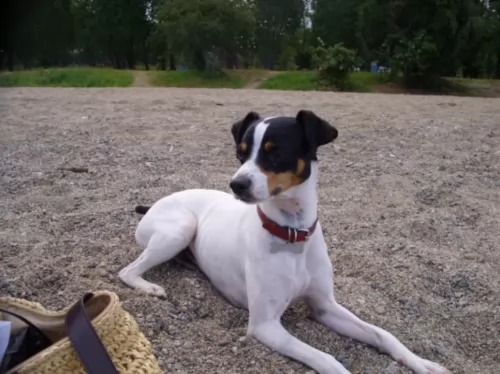 The Chilean Fox Terrier is a lively dog with an alert expression. He has become a popular companion dog, being less aggressive than other Terriers.
The Chilean Fox Terrier is a lively dog with an alert expression. He has become a popular companion dog, being less aggressive than other Terriers.
When you treat him well he becomes a loyal friend and forms a strong bond with his human owners. He gets on well with children who have been taught to respect animals, but he tends to become a bit aggressive around other dogs of the same sex.
Socialization and training however can make him much more relaxed around other dogs.
He is an attractive little dog with his short coat, giving the appearance of being well groomed. He can adapt to country- or city life too. He is such an easy dog to keep too so why not choose him as your 4-legged family member? He promises to make the perfect family companion.
 As a sporting dog, the Large Munsterlander loves his exercise. You can involve him in all kinds of outdoor activities, and he’ll readily join in, from swimming, to hiking to ball games to just plain running for the fun of it.
As a sporting dog, the Large Munsterlander loves his exercise. You can involve him in all kinds of outdoor activities, and he’ll readily join in, from swimming, to hiking to ball games to just plain running for the fun of it.
Always be careful with puppies though, before you involve such a young dog with such strenuous exercise. For a better chance of avoiding hip dysplasia, it is better to wait till he is about 12 months old before you involve him in too many lively activities.
He’s an easily trainable dog too, and the fact that he is a calm, gentle dog who is loving and loyal makes him an excellent pet choice.
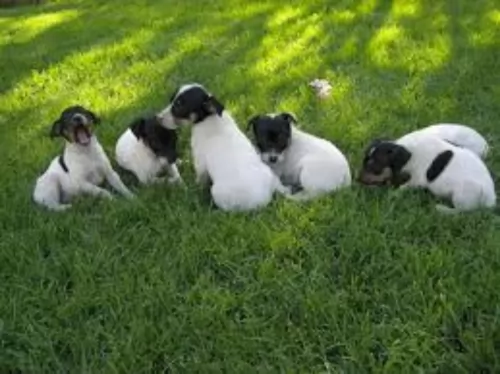 The Chilean Fox Terrier is a healthy breed who doesn’t appear to have any particular health issues. It doesn’t mean that your dog will be free from disease, but it is worth knowing that a quality diet, fresh water and lots of love and attention does enhance longevity in a pet.
The Chilean Fox Terrier is a healthy breed who doesn’t appear to have any particular health issues. It doesn’t mean that your dog will be free from disease, but it is worth knowing that a quality diet, fresh water and lots of love and attention does enhance longevity in a pet.
It is to your benefit to know about one or two common diseases that your dog could get.
You’ll notice your pet’s stomach being swollen. Bloat is a disease which can become dangerous because the stomach can twist. Once this happens, gas can’t escape from the stomach and your pet will want to vomit, he’ll salivate and you’ll notice unusual restless kind of behavior. You need to get him to the vet as soon as possible.
This is also a disease that any dog can develop and can be a complication of another pet disease such as Lyme disease. One of the first signs of kidney disease in dogs is drinking more often than usual and also urinating more often.
He’ll lose his appetite and be lethargic and likely lose weight. Kidney disease is a serious disease and you will need to get your pet to the vet as soon as possible.
 All dogs can develop some health problems no matter how healthy they are, but when they are happy dogs, they’re well fed, exercised and loved, they have a better chance of reaching a ripe old age.
All dogs can develop some health problems no matter how healthy they are, but when they are happy dogs, they’re well fed, exercised and loved, they have a better chance of reaching a ripe old age.
Large Munsterlanders are generally healthy dogs. Some conditions reported in the breed which are highly unlikely to affect your dog, but are good knowing about are hip dysplasia, cataracts and osteochondrosis.
This is a common condition where the joints of quickly growing puppies are affected. The surface of the joint doesn’t convert into bone in certain areas. The result is thickened cartilage which detaches from the surrounding normal cartilage, forming a flap.
Osteochondrosis causes the development of osteoarthritis, affecting certain joints of the dog. Both genetics and the wrong diet are causes of osteochondrosis.
It isn’t always possible to feed your dog wholesome food, but always try to get the very best quality food there is. Also, don’t allow your young Large Munsterlander to be involved in strenuous exercise before he reaches one year of age. Pounding around can put abnormal weight on the joints which can spell problems when the dog is older. Osteochondrosis mostly affects large and giant breed dogs.
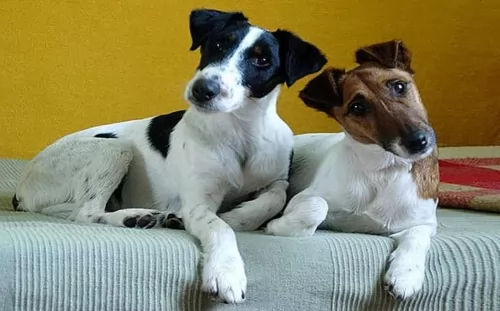 The Chilean Fox Terrier is a low maintenance breed and this means you won’t be having to part with any money on grooming sessions for him. He’ll basically require a brushing twice a week.
The Chilean Fox Terrier is a low maintenance breed and this means you won’t be having to part with any money on grooming sessions for him. He’ll basically require a brushing twice a week.
The Chilean Fox Terrier, as a smaller dog breed, will also require regular dental brushing, as neglecting this can result in dental problems as well as a host of diseases that are associated with gum disease and tooth decay.
Make sure to feed him a quality diet full of vitamins and minerals and ensure he always has fresh, cool water available.
 The Large Munsterlander puppy will require 4 meals a day. When he reaches a year of age, you can give him two smaller meals a day.
The Large Munsterlander puppy will require 4 meals a day. When he reaches a year of age, you can give him two smaller meals a day.
He is a large, active dog and if you feed him manufactured dog food, make sure its high quality and that it caters to his age and energy levels. His dry kibble can be mixed with cooked chicken, brown rice or pasta and cooked or raw vegetables occasionally.
Raw meat can be expensive, but every dog requires some raw meat in the diet every now and then. Without some raw meat, you dog may well suffer with skin problems and a dull coat.
If your dog is still an active hunting dog, a high fat, high protein diet will be good for him. When in any kind of doubt, speak to a dog expert or your vet about how to feed him for health and longevity.
As a sporting hunting dog, the Large Munsterlander has high exercise needs. He most certainly won’t do well in a tiny city garden as he is an outdoor dog wanting to be running and exercising. If you choose this particular dog breed, make sure that you take him on walks, allow him off his leash in the park, play ball games with him and take him with you when you go on hikes.
With his silky coat, you want to be brushing your pet twice a week. If he has been out hunting with you, while brushing him, check for twigs, grass and burrs tangled in the hair.
Other basic care includes trimming the nails, keeping the ears clean and dry inside, brushing the teeth with a canine-approved pet toothpaste and toothbrush for good overall health.